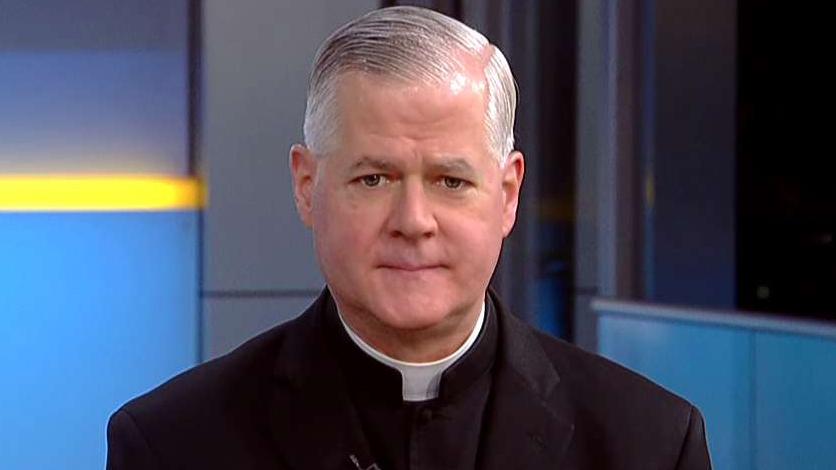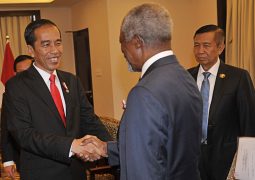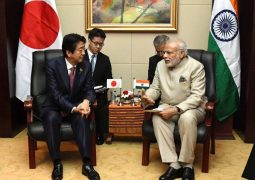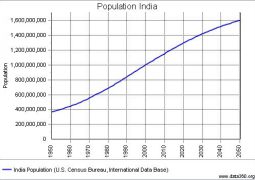Clash of Civilizations? Easter Sunday explosions at multiple churches and hotels rock Sri Lanka, death tolls rises past 200
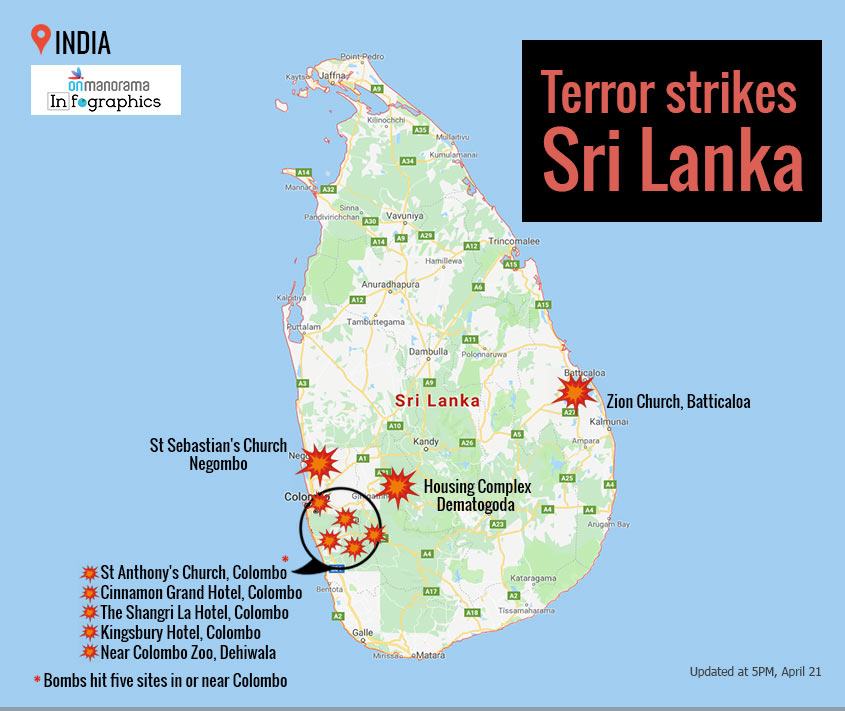
By Louis Casiano, Stephen Sorace. Lucia Suarez Sang.
A pair holding U.S. and British nationalities were among the 11 foreigners killed after a series of explosions struck three churches and three luxury hotels in and just outside of Sri Lanka’s capital Easter Sunday, leaving at least 207 people dead and 450 others injured, officials said.
Sri Lanka’s foreign ministry said the other foreigners whose nationalities have been verified included three Indians, one Portuguese national, two Turkish nationals, and three British nationals.
The U.S. State Department confirmed in a statement that “several U.S. citizens were among those killed” in the explosions, though details were still emerging. Secretary of State Mike Pompeo went on to condemn the Easter morning “terror attacks.”
“Attacks on innocent people gathering in a place of worship or enjoying a holiday meal are affronts to the universal values and freedoms that we hold dear, and demonstrate yet again the brutal nature of radical terrorists whose sole aim is to threaten peace and security,” Pompeo said in the statement.
POPE CELEBRATES EASTER SUNDAY AMID BLOODSHED IN SRI LANKA
The six nearly simultaneous blasts—followed hours later by two more explosions—marked the bloodshed as among the worst since the South Asian country’s 26-year civil war ended a decade ago, a spokesperson for the Sri Lanka police said.
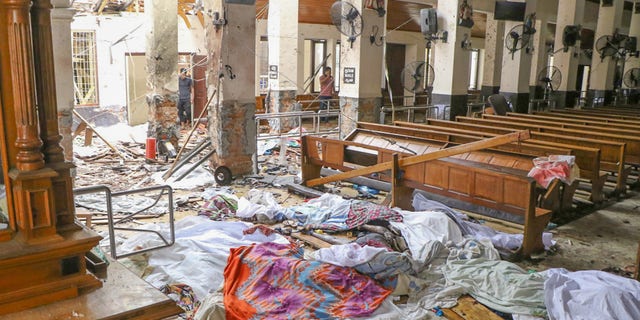
An inside view of the St. Anthony’s Shrine after an explosion hit St Anthony’s Church in Kochchikade in Colombo, Sri Lanka on April 21, 2019. (Photo by Chamila Karunarathne/Anadolu Agency/Getty Images)
A police spokesman said 13 suspects have been arrested in connection with the attacks. Police said they also found a vehicle they believe was used to transport the suspects into Colombo, along with a safe house used by the attackers.
Defense Minister Ruwan Wijewardena described the attacks as a terrorist attack by religious extremists, though no one immediately claimed responsibility. Prime Minister Ranil Wickremesinghe said he feared the violence could trigger instability in the country and its economy.
The explosions collapsed ceilings and blew out windows, killing worshippers and hotel guests. People were seen carrying the wounded out of blood-spattered pews. Witnesses described powerful explosions, followed by scenes of smoke, blood, broken glass, alarms going off and victims screaming in terror.
“People were being dragged out,” Bhanuka Harischandra of Colombo, a 24-year-old founder of a tech marketing company who was going to the city’s Shangri-La Hotel for a meeting when it was bombed. “People didn’t know what was going on. It was panic mode.”
He added: “There was blood everywhere.”
The first explosion occurred around 8:45 a.m. local time, with the deadliest appearing to be at St. Sebastian’s Church in Negombo, a city about 20 miles north of Colombo. Other attacks occurred at St. Anthony’s Shrine in Colombo and Zion Church in the eastern city of Batticaloa. The three hotels – the Shangri La, Cinnamon Grand and Kingsbury Hotel – all in Colombo are frequented by foreign tourists.
Debris inside St. Sebastian’s Church after a blast in Negombo, north of Colombo, Sri Lanka, Sunday. (Associated Press)
The other two blasts occurred in Dematagoda, where the occupants of a safehouse apparently detonated explosives to prevent arrest.
An official told the Associated Press that at least two of the church blasts were believed to have been coordinated attack carried out by suicide bombers.
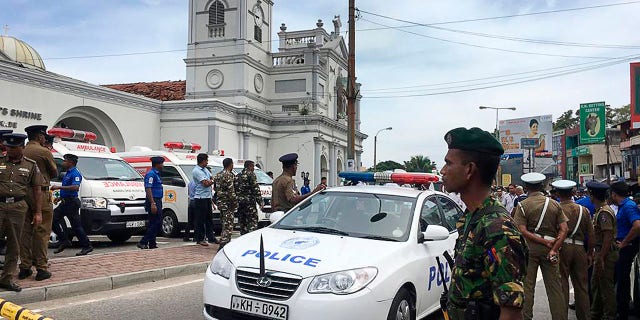
Sri Lankan Army soldiers secure the area around St. Anthony’s Shrine after a blast in Colombo, Sri Lanka, Sunday, April 21, 2019 (AP Photo/Eranga Jayawardena)
“The United States offers heartfelt condolences to the great people of Sri Lanka,” U.S. President Donald Trump tweeted in part early Sunday. “We stand ready to help!”
Former President Barack Obama in a tweet called the Easter bloodshed an “attack on humanity.”
“The attacks on tourists and Easter worshippers in Sri Lanka are an attack on humanity,” Obama wrote. “On a day devoted to love, redemption, and renewal, we pray for the victims and stand with the people of Sri Lanka.”
Cardinal Daniel N. DiNardo, the president of the United States Conference of Catholic Bishops, in a statement condemned the deadly blasts as a “great evil,” and said the attack cannot “overcome the hope” found in the Easter holiday.
St. Sebastian’s pleaded for help on its Facebook page. The explosion ripped the roof off the building and knocked out doors and windows. Churches throughout the country have been placed on alert, with many canceling Easter services.
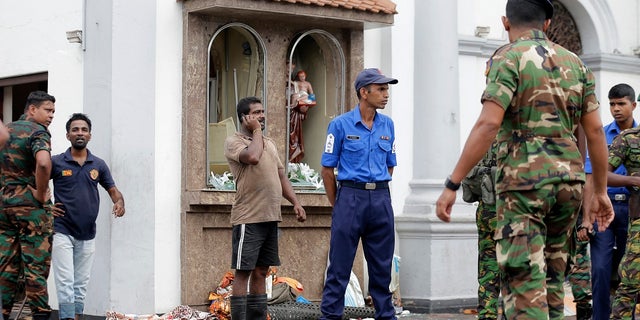
People gather outside St. Anthony’s Shrine where a blast happened, in Colombo, Sri Lanka, Sunday, April 21, 2019. (Associated Press)
Sri Lankan Member of Parliament Harsha de Silva tweeted Sunday of “many casualties including foreigners.”
“Sec Defence and I am at Kochchikade church. Also was at ShangriLa n Kingsbury. PM is on his way from Bentota. Emergency meeting called in a few minutes. Rescue operations underway. Please stay calm and indoors. Many casualties including foreigners,” he posted.
The Archbishop of Colombo, Cardinal Malcolm Ranjith, called on Sri Lanka’s government to launch a “very impartial strong inquiry” and to punish those found responsible “mercilessly because only animals can behave like that.”
Pope Francis denounced the “cruel violence” at the end of his traditional Easter Sunday blessing.
Speaking from the loggia of St. Peter’s Basilica, Francis said: “I want to express my loving closeness to the Christian community, targeted while they were gathered in prayer, and all the victims of such cruel violence.”
He added: “I entrust to the Lord all those who were tragically killed and pray for the injured and all those who are suffering as a result of this dramatic event.”
“New Zealand condemns all acts of terrorism and our resolve has only been strengthened by the attack on our soil,” Ardern said. “New Zealand rejects all forms of extremism and stands for freedom of religion and the right to worship safely.”
Sri Lankan security forces in 2009 defeated Tamil Tiger rebels who had fought to create an independent homeland for the country’s ethnic minority Tamils. The U.N. initially estimated the death toll from 26 years of fighting to be about 100,000 but a U.N. experts’ panel later said some 45,000 ethnic Tamils may have been killed in the last months of the fighting alone.
Sri Lanka, a small island nation at the southern tip of India, has a long history with Christianity. Christian tradition holds that St. Thomas the Apostle visited Sri Lanka and southern India in the decades after the death of Christ. The majority of the island’s Christians are Roman Catholic.
The Associated Press contributed to this story.
- Previous China says Silk Road not geopolitical tool, understands concerns
- Next Dispelling Islamophobia: Syariah espouses mercy, not punishment





